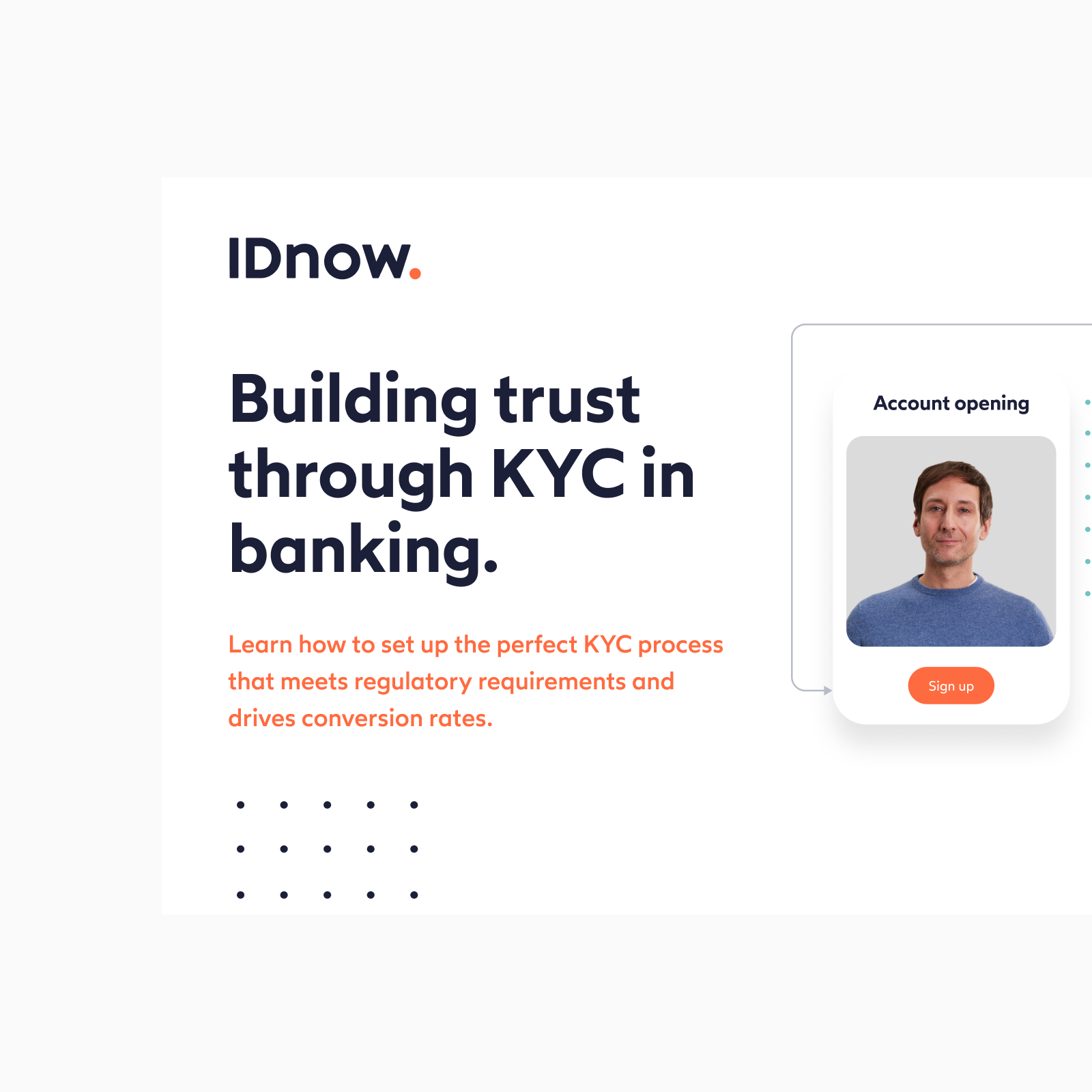New IDnow ebook unpacks the importance of KYC and how it can be used as a competitive differentiator.
In today’s online world, it’s hard to know who to trust. Digitalization and globalization have resulted in significant business challenges, such as increasing risks of fraud and identity theft, especially in the banking sector. Verifying prospective customers before they become users has therefore never been more important.
For this reason, the Know Your Customer (KYC) process has become an integral step in securing financial transactions. Although a common compliance ‘tick-box’ requirement, some KYC processes can be overly complicated and lack transparency, which can lead to customer abandonment during onboarding. To set up a KYC customer journey that works for the business and the customer, it’s important to understand the role of KYC, how it works and how it can be used as a competitive differentiator.
Click below to check out our latest ebook, ‘Building trust through KYC in banking’.
Building trust through KYC in banking.
What is KYC?
 The importance of KYC in the banking sector
The importance of KYC in the banking sectorRegulatory impact on KYC processes

The importance of KYC in banking.
The KYC process is crucial in all situations where customers are involved in financial activities. Verifying a new customer’s identity and assessing potential risks helps banks establish trust in a customer profile, allows the bank to understand the nature of customer activities and provides protection from losses and fraud. Money laundering, in particular, remains a global problem that requires rigorous measures to combat effectively.
According to the United Nations, money laundering accounts for 2-5% of global GDP (about US$800 billion to US$2 trillion) and banks have a major role in protecting against it. Criminal activity in this sector can affect the financial institution involved, customers, and wider markets and economies. Identity fraud can also cause serious financial harm. For example, in the United States, $16.1 billion in losses was attributed to identity theft in 2021.
The days of visiting a bank to inquire about services or make a transaction are quickly coming to an end. Customers are now unwilling to visit brick-and-mortar bank branches, even if they could. In the UK, almost three-fifths of its bank network have closed since 2015. Numbers that are reflected elsewhere in the world.
- UK: 86% of adults use online banking or remote banking.
- Germany: 84% use online or mobile banking to carry out essential bank transactions.
- France: 96% of people actively use their online banking services.
“KYC needn’t be seen as a tick-box exercise that must be performed. The banking sector should see KYC as a valuable competitive differentiator; to not only reassure new customers that you take their business seriously, but existing customers that your bank is a safe and secure place to transact,” said Rayissa Armata, Director of Global Regulatory Affairs at IDnow.
Offering a safe and secure KYC process doesn’t mean it needs to be slow and cumbersome, it can be intuitive and be customized according to customer preference. In 2024 and beyond, as industries undergo their digital transformation, KYC will continue to become even more important.
Rayissa Armata, Director of Global Regulatory Affairs at IDnow.
The regulatory impact on KYC processes.
KYC processes have evolved significantly over the last decade thanks largely to a dynamic regulatory framework. These developments were mainly initiated at the European level and then transposed to the national level. AML laws have also gradually imposed standards applicable to KYC. There are six versions of the Anti-Money Laundering Directive, each of which was developed and released in response to political and societal issues surrounding money laundering and the latest fraud techniques.
While the banking sector and insurance companies are the main industries that are required to perform KYC, so-called non-financial companies are also included. For example, gambling platforms, real estate agents, art dealers, cryptocurrency platforms and sellers of luxury jewelry and precious metals.
Although not specifically designed for KYC, it is also important to consider the General Data Protection Regulation (GDPR) restrictions and requirements. This directly influences the way customer data is managed and requires companies to ensure that personal information collected for KYC is handled in accordance with the principles of privacy and data security.
Companies that do not comply with a country’s KYC obligations not only risk reputational harm and the potential loss of licenses but are also subject to heavy penalties from their national supervisory authority.
The importance of customer engagement, experience and expectations.
While it is mandatory to comply with regulations, the customer experience should never be taken for granted. The old saying “the customer is king” remains true, especially when banks move services online.
Organizations with effective customer experience see an increase of 92% in customer loyalty. In this regard, customers can be a major driving force behind a bank’s success or failure. There are various things to consider when designing the ideal KYC customer journey.
Firstly, are customer expectations. Proficiency and experience with different identification methods varies by country. French residents are more accustomed to online identification than Italian residents, for example. It is also important to consider customer service availability. In some southern European countries, users may be active at night and want to sign up and transact at that time, while further north, it’s more likely to be earlier in the day. This is why it is necessary to provide a real-time 24/7 service, accessible at any time and from any location.
Customer engagement is also very important. As the public are already used to fast and frictionless buying processes and hyper-personalized interactions in other areas of their digital daily life, they expect the same from their bank.
Users expect to be able to sign up for a product or service quickly, and delays in this area may make them lose interest. As there is now a wealth of choice for customers and bank loyalty may no longer be rewarded, the onboarding and verification process is a vital opportunity that can lead to higher conversion rates.
The benefits of KYC in banking.
The main goal of the KYC process is to prevent criminal activity. This helps to protect the bank, its customers and the wider financial markets from fraud and other financial crime. This goes some way to explaining why regulations are so strict.
However, there are other reasons to invest and comply with KYC, including:
- Cost efficient: Good KYC processes can help businesses increase their conversion rates and reduce the costs of manual processing.
- Improve the customer experience: When properly implemented, the KYC process helps avoid friction between the company and the user by granting instant access after verification.
- Build trust in the organization: While the checks and requirements can be onerous, customers want to see that their bank is taking the issue seriously. Compliance establishes credibility.
- Meet legal requirements: As complying with regulations is a legal responsibility, non-compliance can result in hefty fines and lawsuits. Apart from the monetary impact, non-compliance can also damage the company’s reputation.
How IDnow helps banks comply with KYC.
From ID document scans to full identity checks, IDnow offers a range of automated services, including AutoIdent and IDCheck.io, to ensure a smooth and instant customer experience. User onboarding is automated, fraud is detected, and services are fully compliant with KYC and AML/CFT standards.
- Document capture: Our web or mobile SDK enables high-quality dynamic scanning for ID document capture, while providing excellent user experience.
- Biometric capture: Our biometric tools enable users to take a selfie or facial recognition video to verify the identity of document holders.
- Automated and/or manual data verification: Our fully automated document verification API extracts and verifies data in less than 12 seconds. In addition, a team of fraud experts can check documents manually.
In light of increasingly stringent regulations, it’s more important than ever to ensure banks are doing all they can do protect their customers from fraud. Read ‘Banks urged to step up anti-fraud controls as APP scam compensation becomes compulsory.’
By

Jody Houton
Senior Content Manager at IDnow
Connect with Jody on LinkedIn



